Globalization: Going Well?
By Kwon Ji-hye, Student Editor / Kwon Jeong-ha, Tribune Reporter
The development of communication and information technology has accelerated globalization in the world. Globalization defined by Webster's dictionary is a process that renders various activities and aspirations "worldwide in scope or application." Wikipedia defines globalization is increasing global connectivity, integration, and interdependence in the economic, social, technological, cultural, political, and ecological spheres. According to the definitions, it is natural that global interaction and integration among various organizations and individuals are currently increasing as they try to pursue global standards. Universities all over the world are no exception to the continuing trend because they can no longer survive without adapting to it.
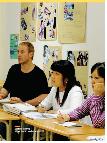
This year Chonnam National University (CNU) has set a goal to become one of the Top 100 universities in the world and is currently making efforts to raise its global standards and to bolster CNU students' international competitiveness in various fields. Chonnam Tribune examined the globalization activities of CNU by focusing on student related programs. Take a closer look as CNU is adopting this new strategy.
Into the World
CNU established the International Center (IC) in 2005 and has established sisterhood relationships with 89 foreign universities in 19 nations such as the University of Missouri-Columbia and Bloomfield College in the U.S.A., the Institute of Management Technology in India, Kyushu University in Japan, Fudan University in China among others. CNU is dispatching exchange students to these sister universities for its expansion of its academic and cultural connections. Above all, the IC is in charge of the majority of international programs and is organizing long-term international exchange programs. In 2006, CNU sent 55 exchange students to sister universities through International Exchange Student Programs. This was a rapid advance as compared with 25 students in 2005. Beside, the majority of colleges dispatch their students to foreign universities. Especially, the Colleges of Business Administration and Agriculture & Life Sciences make vigorous interchange of students. These colleges also have a joint Double Degree Program with universities in the U.S.A. At the completion of this program, you can earn two degrees from the two universities.
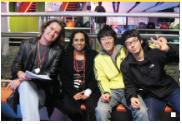
Second, CNU students can also participate in short-term international programs. The International Field Training Program provides the participants to develop a good sense of international business and improve foreign language ability through Language Training combined with an Internship Program. Students can also experience foreign cultures and societies through the World Education Travel Program where participants make traveling plans by selecting which country to go to and decide their travel plans by themselves. During the winter season of 2005-6, about 120 students went abroad through this program. In addition, there are Overseas Volunteer Activities and the Korean-Japanese Cultural Interchange Program. Especially through the Korean-Japanese Cultural Interchange Program, Japanese students can visit Korea and experience Korean real life through a home-stay experience. Korean students can also visit Japan and have an opportunity to experience Japanese culture.
Into CNU Campus
The trend of globalization has increased the number of foreign students on campus over the past few years. The IC supports foreign students in various ways so that they can adjust to our services and culture and learn about how to deal with the difficulties of daily lives on campus. First, CNU assigns a regular portion of dormitory rooms to them and pay additional costs for receiving medical care in case of medical fees exceeding 100,000 won.
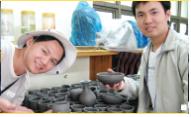
Second, they can participate in a cultural education program such as the Cultural Field Trip (CFT) which is annually held for two days in September and experience Korean culture by traveling around Jeollanamdo. Through this program, they can better understand Korean traditional culture and also foster a sense of belonging to the CNU community. The Language Education Center (LEC) has annually held its "Global Festival" from 2005. In May of this year, the LEC and the Division of External Cooperation held "Sports Festival" for foreign students. The "Sports Festival" aimed to foster a spirit of co-operation between foreign students and native students by playing sports together like couple-soccer and relay races.
Li Rong (Sophomore, Graduate School of Business Administration) participated in the CFT and said, "I experienced the beauty of Jeollanamdo's culture and scenery in Korea. Especially, Dawon (green tea plantation) in Boseong and the Celadon Ware Museum in Ganggin impressed me. I first saw the green tea plantation, which was very wonderful. I made my own pottery in the museum and it was very interesting."
Inside of CNU Campus
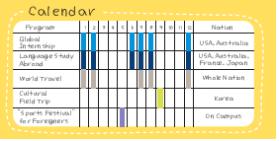
Indeed, international students on campus are becoming more active and dynamic thanks to programs like Korean Mentoring and Making Foreign Friends Program. However, it is clear that foreign students have difficulty in their campus life due to language problems. In order to surmount these problem, they must try to learn Korean language and to understand our culture as if Koreans try to understand foreign language, culture, and thought. A Chinese student said, "I came to Korea two years ago but I did not try to learn Korean language. That is because speaking English is easier to communicate with Koreans. So I still use English." This answer showed that programs related to Korean language and culture need to be more diverse for the number of foreign students should increase.
To Be Better Global University
According to what was mentioned above, CNU took the first step to become global several years ago. It has currently put a great deal of effort into a variety of programs in different ways and the result of the activities has generally been evaluated positively. However, the university seems to take the current forms and direction of globalization into consideration. CNU authorities need to provide sufficient programs for students to be able to understand foreign culture and Korean culture for foreign students. Those programs help them adjust to multicultural surroundings as early as possible in the era of globalization.
CNU native students have to break the boundary of race, gender and age and recognize cultural and ethnic diversities and cultural relativity to raise its globalization standards. They also need to have a positive and active attitude to foster their foreign language ability and their sense of cultural relativism. CNU students are well aware of the fact that they should compete with people of other nations in a global age. But their attitude looks a little passive and negative. When students have more positive and broad-minded attitudes, and comprehend differences without losing our identity, CNU will be more globalized place. We can raise our globalization standard if we take the necessary steps to make CNU's progress towards better globalization.
Commendable Programs:
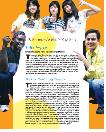
Korean Mentoring Program: The "Korean Mentoring Program (KMP)" offers an opportunity to promote better mutual understanding between Korea and other countries with a foreign friend. This is a kind of voluntary service activity operated by the Language Education Center (LEC). The LEC seeks for volunteers occasionally. If you are become a mentor, you will meet a foreign friend and work as a mentor for around ten weeks. During the period, you should have a meeting more than twice a week and spend hours with your partner. You can have a conversation about cultural difference, teach Korean, have a meal together, or visit somewhere like a museum to introduce Korea.
Here are the stories of participants in the program. Hong Song-i (Junior, Dept. of English Lang. & Lit.) said, "I had desired to have a foreign friend and this program offered me a great opportunity to meet a bona fide friend. As my Indonesian friend speaks both Hindustani and English, I can learn English while teaching him Korean." If you are interested in a foreign language, this program will be helpful to improve your linguistic ability. Jig jid Sh (Foreign student from Mongolia) said, "I came to Korea on June 23th and learning Korean was not easy. But through the KMP, I could learn various things about Korea. I could understand Korean culture more easily. I can consult with my partner about difficulties and barriers in my daily life. I think it is a very helpful program for foreign students." The program is profitable for foreign students to adapt themselves to the Korean community. A mentor has to be not only a Korean teacher, but also a sincere friend. Mentors should give a hand to ease the foreigner's anxiety and remove their language barrier. This program can be a real meaningful experience for both Korean and foreign students alsike. If you want to attend the KMP, please refer to the LEC for information. This is a great chance to go through globalization. Chances are given to those who try. Knock on the door, and it will be opened.
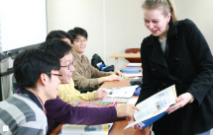
CNU is putting internal efforts into the development of students' foreign language proficiency. In the era of globalization, English is more important than ever before, so students should develop their English ability. Above all, the university adopted Global English as a required course for graduation in 2003. While undergoing Global English courses, students can better understand English-speaking culture as it requires students to do homework in English and to speak with foreign instructors in class. However, some students have complained of Global English course. As Global English has changed from S(satisfactory)/U(unsatisfactory) system course to the credit system, they feel more pressured to gain points.
Second, many departments are delivering major courses in foreign languages in class. All the foreign language departments offer many major lectures in corresponding foreign languages. Besides, the Dept. of Business Administration and the Dept. of Law have opened several major courses in English every semester. These lectures are designed to make students do better at foreign languages. The students rate these lectures positively. Jeong So-yeong (Junior, Dept. of Laws) said, "last semester, I took Legal English, in which we had to speak English. The class was easy to understand and useful, so I was satisfied." Nam Mi-ri-nae (Sophomore, Dept. of Laws) said, "I took English Conversation and Composition for Beginners, which was a little difficult for me, but I was satisfied with the class. I think the class would be more effective if the lecture would be delivered in a combination of English and Korean languages."
Third, CNU established the International Business Academy (IBA) at the Yeosu campus and this academy operates educational programs related to international business activities. This academy offers students who want to become businesspersons an opportunity to gain practical experience in business and to learn and utilize theoretical knowledge at the work place. Therefore, this academy is organized at the Dept. of Industrial Engineering and the Dept. of Political Science at the Gwangju campus, and the Division of International Studies and the Division of Business & Commerce at the Yeosu campus. After finishing basic and theoretical courses, participants in this academy can complete the whole curriculum through domestic internship or overseas job training.
Students Evaluation of Globalization Activities

As above mentionedSsglish"l I use is mudents are d other students are , CNU has worked diligently to become a global university. Then, how can CNU students including foreign students evaluate these activities? Native students estimate the number of international programs is not enough for many of them to participate. Some students who the Tribune interviewed said the university must increase the number and duration of those programs in order to offer a lot of opportunities to gain contact with foreigners and to raise their globalization standards. They said more diverse programs are needed. Jeong Bo-ram (Freshman, Dept. English Lang. & Lit.) said, "I think the problem is that these global programs are not well publicized. Freshman are especially ignorant of CNU's global programs. CNU has to inform freshman of CNU's global programs." They also pointed out that the authorities, including the IC, should make more effort to bring the growing influx of foreign students from a variety of nations into the university. Lee Sun-jung (Sophomore, Dept. of Fine Arts) said, "The majority of foreign students are Chinese. I hope foreign students in CNU would come from diverse countries." Meanwhile, some foreign students pointed out the lack of meticulous attention to their daily lives such as meal service provided in Residence Halls. Mehriniso (Sophomore, Interdisciplinary Faculty of Global Diaspora; Mass Communication) said, "I live in a dormitory. Some students including me from Muslim countries can't eat pork for religious reasons. When pork was served I couldn't take a meal, though now some substitute food is served, I hope this food service gets much better than it is now."
Understanding Cultural Difference Needed
Foreign students' interview mentioned above showed that globalization activities should progress based on understanding cultural differences. Prof. Lee Ju-no, Vice President of the Division of External Cooperation, defined globalization as communicating with the world. He said, "to accomplish globalization, we need to become open and flexible with unfamiliar cultures and to acknowledge cultural values and relativity." At present, there are five hundreds foreign students from 22 countries at CNU. They are in the minority of CNU compared with the number of Korean students but foreign students with diverse nationality are increasing. Therefore, it is very important to understand cultural relativity for overcoming cultural differences and meeting globalization standards in various spheres of the university.
What do international students think of Korean culture? A foreign student from China said, "I envy Korean supportive senior - junior culture where seniors take care of juniors. In China, there is no such culture. I think this culture is good." Some foreign students said that CNU students appear free and active because they participate in many clubs, study group activities, tutoring programs, and festivals.

